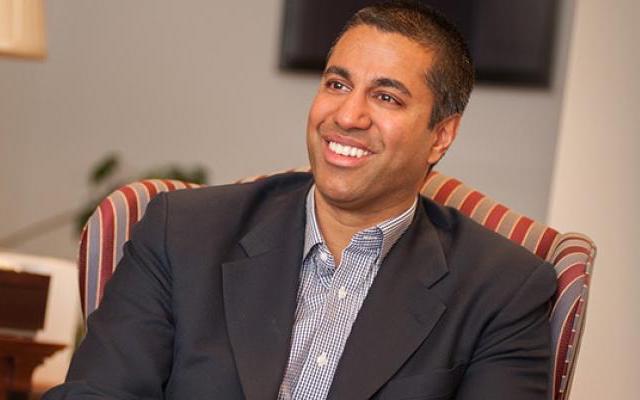
Federal Communications Commission member Ajit Pai yesterday vowed to take a "weed whacker" to FCC regulations after President-elect Donald Trump takes office, with net neutrality rules being among the first to be cut down.
Pai is the commission's senior Republican and could end up being the FCC chairman, at least on an interim basis until Trump chooses a long-term chair.
"I’m optimistic that last month’s election will prove to be an inflection point—and that during the Trump Administration, we will shift from playing defense at the FCC to going on offense," Pai said in a speech yesterday before the Free State Foundation in Washington, DC, said. The commission "need[s] to remove outdated and unnecessary regulations... We need to fire up the weed whacker and remove those rules that are holding back investment, innovation, and job creation," he also said.
Pai has consistently opposed consumer protection rules that the FCC's current Democratic majority imposed on ISPs, including the net neutrality order that forbids blocking, throttling, and paid prioritization.
"On the day that the Title II [net neutrality] Order was adopted, I said that 'I don’t know whether this plan will be vacated by a court, reversed by Congress, or overturned by a future Commission. But I do believe that its days are numbered,'" Pai said. "Today, I am more confident than ever that this prediction will come true. And I’m hopeful that beginning next year, our general regulatory approach will be a more sober one that is guided by evidence, sound economic analysis, and a good dose of humility."
The FCC imposed its net neutrality rules by reclassifying ISPs as common carriers under Title II of the Communications Act. Pai said that "there was no evidence of systemic failure in the Internet marketplace," though he did not mention that the FCC's data shows that many parts of the US have little or no competition for high-speed broadband. Pai called the Title II reclassification "public-utility regulation," saying it "was a solution that wouldn’t work for a problem that didn’t exist." But Pai's opposition to net neutrality rules is not strictly tied to Title II: he also voted against a weaker version of net neutrality in 2014, months before the commission decided to use Title II in order to impose stronger rules that would be upheld in court.
Once Trump is president and Republicans take the FCC's majority, the commission could start the process of overturning the rules or simply decline to enforce them vigorously. Republicans in Congress could also overturn the rules or replace them with weaker ones without fear of a presidential veto.
Pai's FCC term expired in June, but he can remain on the commission until the end of 2017 and will likely be reconfirmed for a new five-year term by the Senate.
Pai praised the Free State Foundation for being "a key voice fighting against the FCC’s regulatory overreach in areas such as Title II, business data services, municipal broadband, set-top boxes, and broadband privacy." Pai pointed out that several FCC orders on prison phone rates and municipal broadband have been overturned in court. "I’m also optimistic that the FCC will once again respect the limits that Congress has placed on our authority," he said. "We can’t simply enact whatever we think is good public policy. We also have to make sure that we have the power to do so."
Pai and fellow FCC Republican Michael O'Rielly consistently accused Democratic Chairman Tom Wheeler of operating in secrecy, arguing that the FCC should release the full text of orders (instead of summaries) before voting on them. Pai yesterday said he believes now is the "time to bring more openness and transparency to the FCC."
O'Rielly also spoke yesterday at the Free State Foundation event, promising to bring more "fairness and transparency" to FCC processes. He praised Trump's call to "eliminat[e] two regulations for every new one created." O'Rielly said he wants to "undo harmful policies" such as the Title II reclassification, privacy rules that protect Internet customers' Web browsing data, and an ongoing investigation into data cap exemptions on the AT&T and Verizon mobile networks.
"Next year’s Commission should consider acting quickly to reverse any damaging policies put into place over the last eight years and in the last few weeks of this Administration," O'Rielly said. "It should likewise close out any problematic notices and dockets."
The FCC should also stop encouraging municipal broadband networks that compete against private ISPs, O'Rielly said in another speech on Tuesday before the New England Ratepayers Association. State laws that restrict municipal broadband "protect ratepayers" from funding government-owned networks that often underperform, he said.
reader comments
355